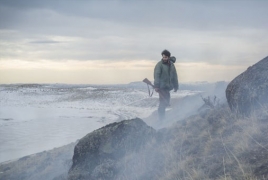“Blind Christ,” “Children,” “Winter” set for Toulouse Films in Progress March 14, 2016 - 15:26 AMT PanARMENIAN.Net - Christopher Murray’s “The Blind Christ”, Maite Alberdi’s “Children” and Emilio Torres’ “The Winter” are set for France’s 29th Toulouse Cinelatino Fest Films in Progress, a traditional launch-pad for titles bound for titles bound for Cannes and beyond, Variety reports. The two-day screenings of movies in rough cut unspools March 16-17 in the city of Toulouse, nestling in the lap of the Pyrenees. A biannual event, Toulouse’s Films in Progress selection features seven filmmakers who all have a feature film track record – quite possibly a record in the Toulouse/San Sebastian twice-a-year event. Equally, three of the movies are Chilean as at San Sebastian’s Films in Progress in September 2015, and five of the six co-productions with France. Tellingly, four are multi-lateral co-productions with Europe, as directors and produces seek to scale up on movies, put films through multiple labs and tap expertise from multiple sources. All of which is a sign of a now highly competitive Latin American arts film scene. A Film Factory pick-up for international as part of a two-pic deal with Chile’s Jirafa – the other title, Alejandro Fernandez Almendras’ “Much Ado About Nothing,” was selected for Sundance, won a Fipresci Intl. Federation of Film Critics nod at last week’s Cartagena Fest, was acquired for most of global by Netflix – Murray’s second feature weighs into Toulouse with the pedigree of development at Cannes’ Cinefondation and the Torino Film Lab, and co-production from Thierry Lenouvel’s CineSud Promotion. Inevitably referencing Luis Buñuel’s “Nazarin,” it turns on a man, who, believing he is a Christ, sets out to perform his first miracle, which is saving a dying friend. Chilean Maite Alberdi’s awaited third feature, “Los Niños” (Children) comes after hybrid “The Lifeguard” and total docu-feature “Tea Time,” presented at BAL Goes to Cannes, films which have rapidly established her as one of Latin America’s most prominent femme documentary filmmakers, a cineaste with an eye for the curious and unusual, redolent in larger social significance, however. “Los Niños,” a 2013 Tribeca Latin American Media Arts Fund winner and Sundance Documentary Film Program turns on a group of friends with Down Syndrome who are facing a stage in their life they are not prepared for: Middle age. While “Tea Time” was a study in democracy, “Children” touches on one of the grand themes of Latin American cinema: the region’s lack of a true social democracy which can protect the weak or persecuted: Think Alejandro Fernandez Almendras’ Sundance-winning justice trilogy or Rodrigo Pla’s Venice hit “A Monster With a Thousand Heads.” The friends fondly imagine that, with their parents now dead, they can grow up and get married. The truth of the matter is that Chilean state support for people with Down Syndrome ends at 25. Directed by Torres, a longtime Argentine a.d and co-scribe of Daniel Burman’s early features “Waiting for the Messiah” (2000) and “Every Stewardess Goes To Heaven” (2002) “The Winter” is “a stylish, modern Western” set in southern Patagonia, said French co-producer Rafael Berdugo. It stars Argentina’s Cristian Salguero and Chile’s Hector Nolguera. And centers on a young man brought in to replace an ageing foreman on a huge estate in the wilds of Patagonia. Winter brews, as his predecessor determines to force him to leave. As a project, “Winter” took a top LCI Seguros award at Mexico’s 2014 Guadalajara Co-Production Meeting. Also playing Toulouse’s Films in Progress is a couple of Brazilian titles – “A Cidade do Futuro” and “Don’t Swallow My Heart, Alligator Girl” – as well as “Rey,” from Argentina. Directorial duo Claudio Marques and Marilia Hughes’ follow-up to Rotterdam competition entry “After the Rain,” a coming of age tale set in 1984 as Brazil emerged from dictatorship, “Cidade” returns to “Rain’s” central theme of historical change. Here, set in the North-East drylands of Brazil, film centers on an unconventional family – Mila, a drama teacher, is pregnant by Gilmar, a history teacher, but in a relationship with Igor – a cattle herder. “The detached way in which many young men and women break free from a patriarchal, sexist and male-chauvinistic structure stands out in a society dominated by the imagery of the fearless, macho, cattle herder, the sertanejo,” Marques wrote, presenting “Cidade” to Berlin Talents. Distributed in Brazil by Tucuman Filmes, an energetic arthouse outfit, “Don’t Swallow My Heart, Alligator Girl” reps the latest from screenwriter-director Felipe Bragança, who co-penned Karim Ainouz’s “Praia do Futuro,” a 2014 Berlin Competition player, and his “Love for Sale,” and co-helmed “The Escape of the Monkey Woman,” which played Cannes Directors’ Fortnight. An adventure love story, it is set against the background of conflict between an indigenous community and farmers on the Brazil-Paraguay border. Closely linked to Toulouse and San Sebastián – his debut “Lucia” world premiered at the latter in New Directors in 2010, won multiple prizes at Toulouse six months later including a Fipresci nod – Santiago de Chile-based filmmaker Niles Atallah will present “Rey,” a five-way co-production between Chile, France, Germany, Netherlands and Quatar, receiving a Doha Film Institute Fall 2015 grant. Set in the realms of magic realism, it tells the true tale of a 35-year-old French lawyer who in 1860 is proclaimed King of Araucania and Patagonia, which lands him in a Chilean cell. Photo: San Sebastian Intl. Film Festival The creative crew of the Public TV had chosen 13-year-old Malena as a participant of this year's contest. She called on others to also suspend their accounts over the companies’ failure to tackle hate speech. Penderecki was known for his film scores, including for William Friedkin’s “The Exorcist”, Stanley Kubrick’s “The Shining”. The festival made the news public on March 19, saying that “several options are considered in order to preserve its running” Partner news |